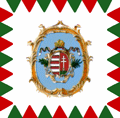
3/17/2018 - The American Hungarian Federation's annual commemoration of Hungarian National Day and the anniversary of its historic 1848 democratic revolution led by Louis Kossuth for 2018 was held at the Hungarian Embassy in Washington, DC on March 10th. The keynote addresses were provided by Zsigmond Perényi, Hungarian Deputy Secretary for International Affairs and AHF Chairman Frank Koszorus, Jr.
Hungarian Ambassador, Dr. Szabó László, gave opening remarks. The keynote addresses were provided by Zsigmond Perényi, Hungarian Deputy Secretary for International Affairs, and AHF Chairman Frank Koszorus, Jr.
In keeping with tradition, the Hungarian Scouts of Washington led the audience in patriotic performance, "Emlékezz velünk" (remember with us) and "Kossuth Dalok" (patriotic Kossuth songs). The event closed with Reverend Judit Máyer.
Mr. Koszorus remarks, "The Spirit of Kossuth" are below and available for [download]:
Statement of Frank Koszorus, Jr.
On the Occasion of the Commemoration of the
Hungarian Revolution of 1848
Washington, D.C.
March 10, 2018
Your Excellency, Mr. Deputy Assistant Minister, Distinguished guests, ladies and gentlemen, future leaders of our community!
A fleeting thought crossed my mind as I was planning the program for this year’s commemoration of the Revolution and War of Independence of 1848 – 1849, a commemoration my organization the American Hungarian Federation has sponsored since its founding in 1906.
Why do we come together every Ides of March? Why are we not taking a walk in the park on the eve of spring or watching March Madness? Why do we instead sing Kossuth songs, recite the same poetry, listen to speeches about ‘old, dead white men?
What ‘relevance,’ does all of this have for us today? Haven’t we already and many times over heard the, ‘All for the people and all by the people. Nothing about the people without the people. That is Democracy, and that is the ruling tendency of the spirit of our age,” words uttered by Lajos Kossuth over a decade before President Abraham Lincoln's famed ‘for the people, by the people’ speech given at Gettysburg in 1863?
As I pondered the question, I was reminded of Theodore Roosevelt’s eloquent words when on April 2, 1910 in the Hungarian parliament he said, "There is no more illustrious history than the history of the Magyar nation. . . . The whole civilized world is indebted to Magyarland for its historic deeds.”
And there are moments when Hungarian and American histories are inextricably linked, as today when both are NATO allies or in 1849 when Kossuth, known as the Champion of Liberty, was strongly influenced by America’s Declaration of Independence when Hungary sought its independence from Vienna.
Kossuth himself noted, "The Declaration of Independence cast a ray of consolation over the injured land whose chief is a wandering exile for having dared to imitate you." And indeed, what a powerful model the American Declaration is -- one to be voluntarily imitated, not imposed from the outside:
“We hold these truths to be self-evident, that all men are created equal, that they are endowed by their Creator with certain unalienable Rights, that among these are Life, Liberty and the pursuit of Happiness.”
So then it becomes self evident that one reason we commemorate today is to preserve a proud heritage and honor those Hungarians who by their actions wrote a history, to which, in Theodore Roosevelt’s words, “the whole civilized world is indebted.”
But there is another equally if not more compelling reason. Rackoczi, Szechenyi, Petofi, Kossuth, the Hungarian heroes who helped save lives during the Holocaust, Nagy Imre and the Pesti srac of 1956 and the democrats of over twenty years ago who abolished an oppressive form of government, just to mention a few, guide and inspire us.
Their principles and tremendous sacrifice impose a special responsibility on us to remember the democratic values, independence, liberty and sovereignty championed by Kossuth and the Hungarian patriots of the Ides of March.
Since its founding the Federation has proudly and diligently passed on the memory of this rich heritage from generation to generation and continues to do so, especially as one finds so much fake news or fake history cavalierly being spread around about Hungarians in the public domain today.
Thank you for your attention and for joining us in this critically important endeavor.
I would particularly like to thank the Scouts -- the baton will be passed to you; run with it!
# # #
Join and Support us online!

[<< Back to all 1848 news]
[<< Back to All AHF News]
| [< back to AHF 1848 Commemorations]
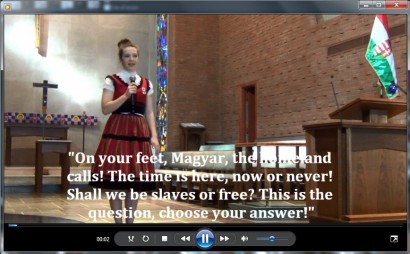
[Watch the 2014 video on
AHF's YouTube Channel]
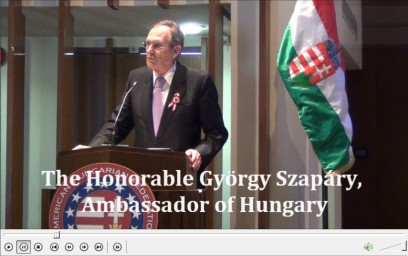
[Watch the 2014 video on
AHF's YouTube Channel]
Related Articles:
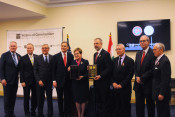 3/26/2018 - On Wednesday, March 21, 2018, the American Hungarian Federation
and the
Victims of Communism Memorial Foundation hosted a Congressional Reception commemorating Hungarian National Day, Lajos Kossuth and the 1848 Hungarian War of Independence, and honoring Representatives Andy Harris (R-MD) and Marcy Kaptur (D-OH),
Co-Chairs of the Congressional Hungarian Caucus who were presented with AHF's Lajos Kossuth Award in recognition of their support in strengthening U.S. relations with Hungary and of democracy and human and minority rights in Central and Eastern Europe. [Read more] 3/26/2018 - On Wednesday, March 21, 2018, the American Hungarian Federation
and the
Victims of Communism Memorial Foundation hosted a Congressional Reception commemorating Hungarian National Day, Lajos Kossuth and the 1848 Hungarian War of Independence, and honoring Representatives Andy Harris (R-MD) and Marcy Kaptur (D-OH),
Co-Chairs of the Congressional Hungarian Caucus who were presented with AHF's Lajos Kossuth Award in recognition of their support in strengthening U.S. relations with Hungary and of democracy and human and minority rights in Central and Eastern Europe. [Read more]
Shortcuts:
Downloads:
Famous Quotes
 "The house of Habsburg-Lorraine, perjured in the sight of
God and man, had forfeited the Hungarian throne." "The house of Habsburg-Lorraine, perjured in the sight of
God and man, had forfeited the Hungarian throne."
Hungary, April 1849
"All for the people and all by the people. Nothing about
the people without the people. That is Democracy, and that is the ruling
tendency of the spirit of our age."
Spoken before the Ohio State Legislature,
February 16, 1852
About Louis
Kossuth
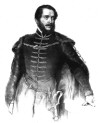 Kossuth
Lajos (b. 1802, d. 1894, pronounced co-shoot luh-yôsh) was Governor of Hungary during fight for independence and democracy which
was eventually defeated by the union of the royalist Austrian Habsburg
and Russian Czarist Armies (1848 - 1849). Kossuth envisioned a federation
in the Kingdom of Hungary in which all nationalties participated in a
vibrant democratic system based on fundamental democratic principles such
as equality and parliamentary representation. The bloody conflict eventually
led to a great compromise known as the "Austro-Hungarian Empire,"
in which Hungary gained some autonomy. although Kossuth would have no
part in it and demanded full indepependence until his death. Kossuth
Lajos (b. 1802, d. 1894, pronounced co-shoot luh-yôsh) was Governor of Hungary during fight for independence and democracy which
was eventually defeated by the union of the royalist Austrian Habsburg
and Russian Czarist Armies (1848 - 1849). Kossuth envisioned a federation
in the Kingdom of Hungary in which all nationalties participated in a
vibrant democratic system based on fundamental democratic principles such
as equality and parliamentary representation. The bloody conflict eventually
led to a great compromise known as the "Austro-Hungarian Empire,"
in which Hungary gained some autonomy. although Kossuth would have no
part in it and demanded full indepependence until his death.
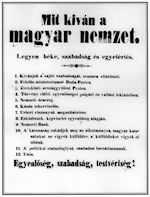 The speech from which the above excerpt is taken was given over a decade
before Lincoln's famed "for the people, by the people" speech
given at Gettysburg in 1863. Kossuth was the first foreign Statesman officially
invited to the US since the Marquis de Lafayette. His upcoming speech
in the Congress of the United States made the pre-civil war joint house
nervous due to his democratic views on equality of all men. Kossuth learned
English while in prison and exile and spoke to half the population of
the US who enthusiastically greeted and flocked to hear him. Despite Hungary's
epic struggle and Kossuth's brave and noble efforts, the US, the "Bastion
of Democracy" turned him away, empty handed. Hungary was alone again
in its fight for democracy in 1956, and didn't gain freedom until 1989 and would soon join NATO. The speech from which the above excerpt is taken was given over a decade
before Lincoln's famed "for the people, by the people" speech
given at Gettysburg in 1863. Kossuth was the first foreign Statesman officially
invited to the US since the Marquis de Lafayette. His upcoming speech
in the Congress of the United States made the pre-civil war joint house
nervous due to his democratic views on equality of all men. Kossuth learned
English while in prison and exile and spoke to half the population of
the US who enthusiastically greeted and flocked to hear him. Despite Hungary's
epic struggle and Kossuth's brave and noble efforts, the US, the "Bastion
of Democracy" turned him away, empty handed. Hungary was alone again
in its fight for democracy in 1956, and didn't gain freedom until 1989 and would soon join NATO.
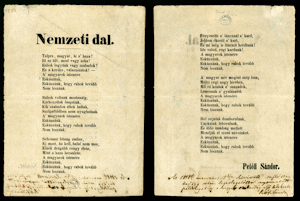 Today, there are many reminders of Kossuth's impact on America and the
world. In North America, there is a Kossuth County in the state of Iowa,
a town with his name in Indiana, Ohio and Mississippi,
a settlement with a Kossuth Post Office is in Pennsylvania. In addition,
there are Kossuth statues and plaques in New York, Cleveland, Akron, New
Orleans, Washington, and Ontario, Canada. The Hungarian
Reformed Federation's building on Dupont Circle, in Washington, DC
is called Kossuth House with a memorial plaque commemorating his speech
on democracy. See the picture gallery and memorials on Louis
Kossuth in North America. Today, there are many reminders of Kossuth's impact on America and the
world. In North America, there is a Kossuth County in the state of Iowa,
a town with his name in Indiana, Ohio and Mississippi,
a settlement with a Kossuth Post Office is in Pennsylvania. In addition,
there are Kossuth statues and plaques in New York, Cleveland, Akron, New
Orleans, Washington, and Ontario, Canada. The Hungarian
Reformed Federation's building on Dupont Circle, in Washington, DC
is called Kossuth House with a memorial plaque commemorating his speech
on democracy. See the picture gallery and memorials on Louis
Kossuth in North America.
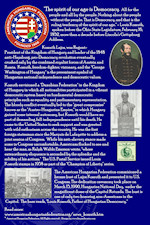
AHF presents a gift to to the American People: The Kossuth Bust in the US Capitol [read more]
|
The renowned Ralph Waldo Emerson said in greeting Kossuth on his arrival
at Concord, MA, May 11, 1852:
"[we] have been hungry to see the man whose extraordinary eloquence
is seconded by the splendor and the solidity of his actions."
Kossuth was greeted with wild enthusiasm across the country. He was only
the second foreign leader (second to Lafayette) to address a joint session
of Congress.
The American Hungarian Federation dedicated a bust that now sits proudly in the US Capitol - it reads, "Louis
Kossuth, Father of Hungarian Democracy" [read more]
Audio
Resources
 Hear
Louis Kossuth Speak! [Click Here] - This is the speech of Louis Kossuth which he gave for the dedication of the statue for the 13 Hungarian generals, who were executed at Arad, Hungary, on October 6, 1849 (Arad is in Rumania today after annexation due to the Treaty of Trianon in 1920 ).
Louis Kossuth was exiled after the fall of the Hungarian Liberation Fight of 1848 and made his permanent home in Torino (Turin), Italy. He could not attend the dedication of the monument at Arad, without risking arrest, so he recorded his speech inTurin, and sent it to Arad using the new technology of sound recording, called the phonograph. Hear
Louis Kossuth Speak! [Click Here] - This is the speech of Louis Kossuth which he gave for the dedication of the statue for the 13 Hungarian generals, who were executed at Arad, Hungary, on October 6, 1849 (Arad is in Rumania today after annexation due to the Treaty of Trianon in 1920 ).
Louis Kossuth was exiled after the fall of the Hungarian Liberation Fight of 1848 and made his permanent home in Torino (Turin), Italy. He could not attend the dedication of the monument at Arad, without risking arrest, so he recorded his speech inTurin, and sent it to Arad using the new technology of sound recording, called the phonograph.
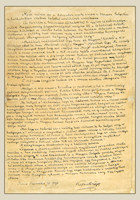 The recording was made on September 20, 1890, when Kossuth was 88 years old. It is a sad fact that the monument Kossuth sent his speech for was torn down by the Rumanian government when they annexed Transylvania, along with Arad, in 1920, after World War I. The recording was made on September 20, 1890, when Kossuth was 88 years old. It is a sad fact that the monument Kossuth sent his speech for was torn down by the Rumanian government when they annexed Transylvania, along with Arad, in 1920, after World War I.
The original
recording on two wax cylinders for the Edison phonograph survives to this
day, although barely audible due to excess playback and unsuccessful early
restoration attempts. Lajos Kossuth is the earliest born person
in the world who has his voice preserved. Since the audio
is of such poor quality, here is it is transcribed in Hungarian and translated
to English (special thanks to Louis
Kossuth in North America)
Hungarian |
English |
"A világ bírája
a történelem fog e kérdésre felelni. Legyenek
a szentemlékû vértanúk megáldottak
poraikban, szellemeikben a hon szabadság Istenének
legjobb áldásaival az örökkévalóságon
keresztül; engem ki nem borulhatok le a Magyar Golgota porába,
engem október 6-a térdeimre borulva fog hontalanságom
remete lakában látni a mint az engem kitagadott Haza
felé nyújtva agg karjaimat a hála hû
érzelmeivel áldom a vértanúk szent emlékét
hûségükért a Haza iránt, 's a magasztos
példáért, melyet az utódoknak adtanak;
's buzgó imával kérem a magyarok Istenét,
hogy tegye diadalmassá a velõkig ható szózatot,
mely Hungária ajkairól a Magyar Nemzethez zeng. Úgy
legyen Ámen!
Turin
September 20 1890
Kossuth Lajos |
"The judge of the universe,
history, will decide over this question. Should the saintly remembered
martyrs be hallowed in their ashes, in their spirit with the highest
blessings of the Lord of Liberty and through eternity; I can not
pay my sympathies to the ashes of the Hungarian Golgotha, but October
6 will find me on my knees in this reclusive home of exile, as I
open my arms to my disowning homeland. With gratitude's faithful
sentiments, I bless the martyrs' sacred memory for their faith in
their homeland and for the sublime example they left to their heirs:
with ardent prayer I beg the God of Hungarians to make their appeal
which echoes from the lips of Hungaria to the Hungarian Nation.
So be it, Amen!
Turin
September 20 1890
Lajos Kossuth |
|
Click to hear the recording: |
"Kossuth Lajos azt üzente,
elfogyott a regimentje.
Ha még egyszer azt üzeni,
mindnyájunknak el kell menni,
Éljen a magyar szabadság,
Éljen a haza ! |
Esik esõ karikára,
Kossuth Lajos kalapjára.
Valahány csepp esik rája,
Annyi áldás szálljon rája,
Éljen a magyar szabadság,
Éljen a haza!" |
Links
- AHF and the Kossuth Bust in the US Capitol
- AHF commemorating 1848
- President Bush Honors 1848 and Hungary's Contributions to Democracy
- HRFA's excellent Kossuth in America [visit]
- Select Speeches of Kossuth, Condensed and Abridged, with Kossuth's
Express Sanction [visit]
- Louis Kossuth, Mason And Apostle Of World Democracy [visit]
- Count Apponyi's Oration on the Death of Louis Kossuth [visit]
- Wikipedia - [visit]
and add your thoughts!
- Louis Kossuth in North America [visit]
- Kossuth County, Iowa [visit]
- Kossuth County, Iowa statue dedication
[visit]
- Dedication of statue to replace one destroyed by
Rumanian occupation
forces in 1921:
Gyergyócsomafalva, Transylvania [visit]
|




